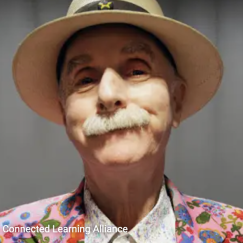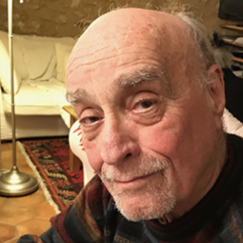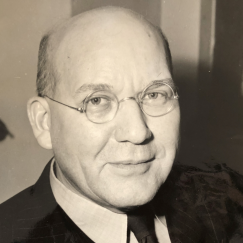If students are not trained to ask basic questions about the images which confront them, if they are not asked to examine the knowledge and assumptions which they already possess, they are being denied the opportunity to develop the most simple and essential critical tools.
Bio/Short Description
Freelance writer and researcher specialising in media education. After teaching in London schools, worked at the British Film Institute from 1979 to 2007, including 8 years (1999-2006) as Head of Education. Main aim was always to develop good practice in media education and to advocate its importance as an entitlement for all learners. Interest is now focused on how children begin to learn about moving-image media, before they are three years old, via doctoral research on this at UCL Institute of Education, London.
HOW THEY INFLUENCED YOU?
External Links
Cary bazalgette.net
Other Grandparents
 ColinPosted By: Renee HobbsOn:07/13/2025 - 00:50
ColinPosted By: Renee HobbsOn:07/13/2025 - 00:50
 BillPosted By: Renee HobbsOn:06/29/2025 - 20:45
BillPosted By: Renee HobbsOn:06/29/2025 - 20:45
 HowardPosted By: Renee HobbsOn:01/27/2024 - 22:47
HowardPosted By: Renee HobbsOn:01/27/2024 - 22:47
 Gary Posted By: Renee HobbsOn:01/01/2024 - 00:39
Gary Posted By: Renee HobbsOn:01/01/2024 - 00:39
 Clyde Posted By: Renee HobbsOn:04/04/2023 - 18:16
Clyde Posted By: Renee HobbsOn:04/04/2023 - 18:16


Renee Hobbs
I first encountered Cary Bazalgette through her essay, "The Politics of Media Education," which was reprinted in Alvarado and Boyd-Barrett's edited book, Media Education: An Introduction in 1992. When I met her, I was so impressed at her approach to teacher education! What a terrific teacher she is!
We once had an opportunity to collaborate at a 2-day masterclass on media education that we offered in the Netherlands. At that time, Cary was emphasizing media education within the context of cultural heritage, and we discussed the implications of this focus. I certainly remember our many discussions about the humility needed for teaching teachers. She once told me, "Renee, when you teach teachers, you can be sure that 20% will do things with what you've given that far exceed your wildest imagination, developing extraordinarily innovative work that makes you think in new ways about media education. Another 20% will do just what you've taught them and nothing more. Be assured: many will never do anything with what you've taught them. Worst of all, some teachers will take what you've taught them and turn it into the most horrible stuff you can possibly imagine, so much so that you'll be ashamed when they tell you that they learned it from you!" I have often reflected on the wisdom and the paradox embedded in this wry comment in the context of my own work as a teacher educator.
markreid1895
Cary appointed me to my first role at the BFI in 1998. She created a team of talented and committed people amongst whom I felt privileged to work. Between 2002 and 2008 we worked together on a campaign to raise the profile of the moving image as a fundamental part of children's literacy. Reframing Literacy set an agenda in primary education in the UK that is still playing out, long after the structures that enabled it (especially local authority infrastructure) have fallen away.
Cary combines a rigorous, critical, research based approach to practice, with a deeply rooted care for the cultures and experiences of children. She continues to be a powerful advocate for the value of moving image culture and, in her most recent research venture, a model for how we should continue to be curious, enquiring, and questioning in this field, rather than rest on the laurels of what we know already.